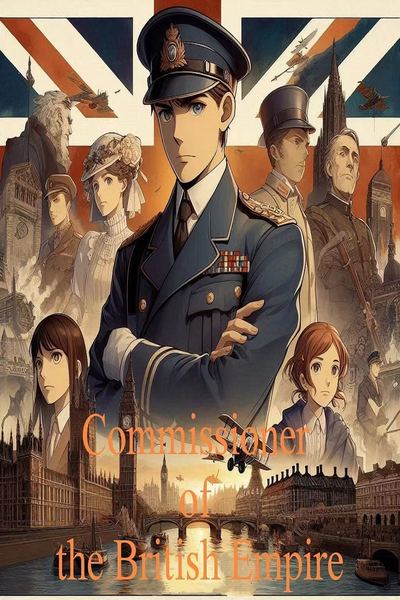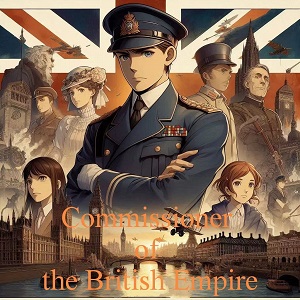Outside the window of the car came cacophonous noise from time to time, Alan Wilson, however, has already practiced the ability to turn a deaf ear, to isolate themselves from the outside world with the curry flavored English, young face as if it had been ironed, a pair of eyes did not move from the hands of the newspaper at all, the front page headline with the eye-catching headline, "The British Empire has in a matter of months, the recapture of the whole of Burmaof certainty."
"Ay!"With an imperceptible sigh, so small that even the party could not hear it, Alan Wilson put down the paper and looked flatly out the window, the heavily accented English hooting and hollering long gone from his ears.
It's 1945, and the biggest difference between New Delhi and Delhi is that New Delhi is an entirely new urban area, where Britain moved the capital of British India because Calcutta was too far away, and New Delhi has long been inhabited only by the British.
In 1945, this is Alan Wilson to face the biggest problem, rampant world three hundred years of the British Empire has been thinning, although still has thirty million square kilometers of colonies, five million troops fighting on the battlefields around the world, but the end of this World War, only the beginning of the decline of the British Empire.
Compared to the United States and the Soviet Union, two over ten million troops, a dominant land and a dominant sea country, it seems that the post-war world has no place for the British Empire, the former hegemon, which makes Alan Wilson, a civil servant ready to replicate the journey of countless classic protagonists, feel at a loss.
And with the memory of his previous life, Alan Wilson certainly understands that the horn of the disintegration of the British Empire was first blown in the land under his feet now, the most important colony of the British Empire in the world, British India with an area of more than four million square kilometers.
And this is simply can not be stopped, not to mention Alan Wilson is only a non-senior official, even if he is now the Governor General of India, but also can not ignore has become the consensus of British India's independence voice, all you can think of is the early day or the late day, may be able to reap what benefits from it.
When Alan Wilson got off the bus and passed through the guards again, he stood right in front of the Viceroy's House of India, which was very similar to the White House, and with his eyes sweeping from the British Indian flag on the dome of the Viceroy's House, he knew that the road ahead of him.
"Sir, what's the matter with you?" the guard who had just finished his inspection looked at Alan Wilson and said with some amusement, "But someone as young as you is rare in the Governor's Office."
"I'll take that as a compliment, thank you," Alan Wilson replied with a slight bow of his head and a smile that hid the embarrassment he had just felt, as he walked towards the building that resembled the White House.
In the middle of the Viceroy's residence, it was full of office workers in a hurry, and in a well-lit room, the current Viceroy of India, Archibald Percival Wavell, stretched out his hand in front of the fireplace to soak up the heat, and without looking back, he asked, "Barron, the people from the PML-N and the Congress Party have already left?"
"Yes, Governor, they have left," the man named Barron, who appeared to be in his mid-forties, with a polished and obviously well-groomed face, replied in a serious voice, "Every time the two sides meet, the disagreements seem to be more, not less, than the last, and that's not just for the two sides, but for us as well."
"Damn it, the Prime Minister must not want to hear about this," Governor Wavell grunted in a not-so-loud voice, but it was more a helpless sigh than a grunt; the internal strife that gave him headaches from time to time had always managed to dampen his good humor as Viceroy of India more than the public news that the Anglo-Indian corps at the front had stormed into Burmese territory and were about to wipe out the Japanese.
"They, and Ali Jinnah and Nehru, whom they represent, are giving us a great headache, Mr. Governor!"Though Barron still had an airy look on his face, he had to admit that compared to the World War, which had already seen the dawn of victory, the biggest question was whether the jewel of the British Empire still shone as brightly as it did now.
There was a suffocating silence in the room, except for the coals burning in the fireplace.
There were some liberal imperialists in the Conservative Party who claimed that the inputs in India and even in the whole colony had exceeded the outputs, and hoped that the British Empire would give up the whole colony and stop the present money-losing business.
Just as one hundred and fifty years ago, the author of the Wealth of Nations, Adams, called for the independence of the thirteen states of North America, for the same reason that British India was the same as the original thirteen states of North America, has become a black hole that consumes the wealth of the British Empire.
However, in the Conservative Party this voice is not the mainstream, now the British Empire Prime Minister Churchill, has also always claimed to defend the glory of the British Empire, but now a few of the leading figures of British India, it is clear in their hearts that things are far from being so simple.
"Inform London of the news that the British Indian Army is deep in Burma, Barron," Governor Wavell drew his hands back from the fireplace and sighed, "London still wants more good news, put the Congress and the PMLN on the back burner."
"Yes, Governor!" Barron agreed with a programmed smile, took a few steps back and left the room.
The entire Viceroy's Residence in India, as was the norm in times of war, appeared to be very busy, with everyone wearing the color of haste, dealing with information on the battlefield of British India as well as all of Southeast Asia.
Barron, who had left Viceroy Wavell, was waiting for his guest of the day with a gentle countenance, and during this time he was not idle, but playing chess with himself and with two minds.
It wasn't long before a servant pushed open the door and Alan Wilson, following behind, entered, and without looking up, Barron stepped out to make the final move and finish the game of chess before looking up at the young man before him.
He stood up and gestured for Allen Wilson to sit down before returning to his seat, pulling out a stack of folders and reading them to himself, his afterglow sizing up the visitor as if verifying his identity.
"You are Groot Wilson's son, and I am very saddened by the loss of your father. He and I were close," Barron said as he looked over the papers, "Born in London in 1924, he then followed his father's work to live in Shannon, where he obtained information of great importance to the Allies prior to Pearl Harbor and the subsequent fall of the Shannon Colony to Calcutta. You were admitted to Oriental College, Oxford, before the war."
At that, Barron closed the bag of papers and said, "Your father could have had a bigger job, but unfortunately there is still more disease here in South Asia.Alan, you are a bit younger than I thought."
"Maybe that's not a big advantage! My entry into the Eastern Department is mainly due to my father's work experience," Alan Wilson replied softly, and couldn't help but sigh in his heart, he had already used the special circumstances of the colony to convince his father in this life to change his age to three years older, as the primary and secondary school curriculum was really not that difficult for him...
As for providing information about Pearl Harbor, the intention was that he would be a take-it-or-leave-it rich kid, gilding the lily while letting his father, who was a civil servant, soar, but it turned out that God didn't want that, and the responsibility of entrepreneurship fell back on his shoulders.
"Very good, but don't be too modest, your studies are very good, if not for the outbreak of the world war, you could be the smallest graduate of Oxford University in recent years," Barron sat in his chair and nodded his head in satisfaction, then the conversation turned to ask, "Although you haven't completed your studies, some concepts about Orientalism have accumulated, what do you think of India as a place?"
Barron knew the purpose of this age person, similarly, Alan Wilson also knew what the purpose of this question from the head of the civil service was, both sides knew each other's thoughts, unspoken.
"Hmm?"Alan Wilson pondered for a moment and quickly gave his answer, "There is no doubt that during the period of the Agricultural Age, the Eastern countries could accumulate far more massive wealth than Europe because of their advantages in size as well as geography.South Asia is the best of them, and British India has always been the cornerstone of the British Empire's prosperity, the brightest jewel in its crown, both in the past and the present.
Nodding in agreement, Barron heard Alan Wilson continue, "It was because of the wealth created by the extensive colonies that the British Empire was able to stand up to challenger after challenger, whether it was Napoleon or William II. India was a land of wealth, and Oxford University opened up the systematic study of Orientalism, producing a large pool of talent that had a broad vision and recognized the nature of the world more than the narrow minds of other European nations."
Said in the end Alan Wilson also complimented the University of Oxford, he knew that Barron also came from the University of Oxford, from this aspect to draw the relationship between the two sides closer.
Obviously Barron to this young man who came here is very satisfied, think of each other's father and their own relationship is good, the heart also has a little carry the significance of this place in British India, Barron's authority is not worse than a few top figures.
As the head of the civil service Barron quickly asked the views of British India, as well as now and then rise up the Congress Party, the PML-N, as well as on Gandhi, Nehru and Ali Jinnah, these local political figures of India's consciousness.
Allen Wilson gave his own answers to all of these questions, as well as some ideas for the future.











Comments (0)
See all